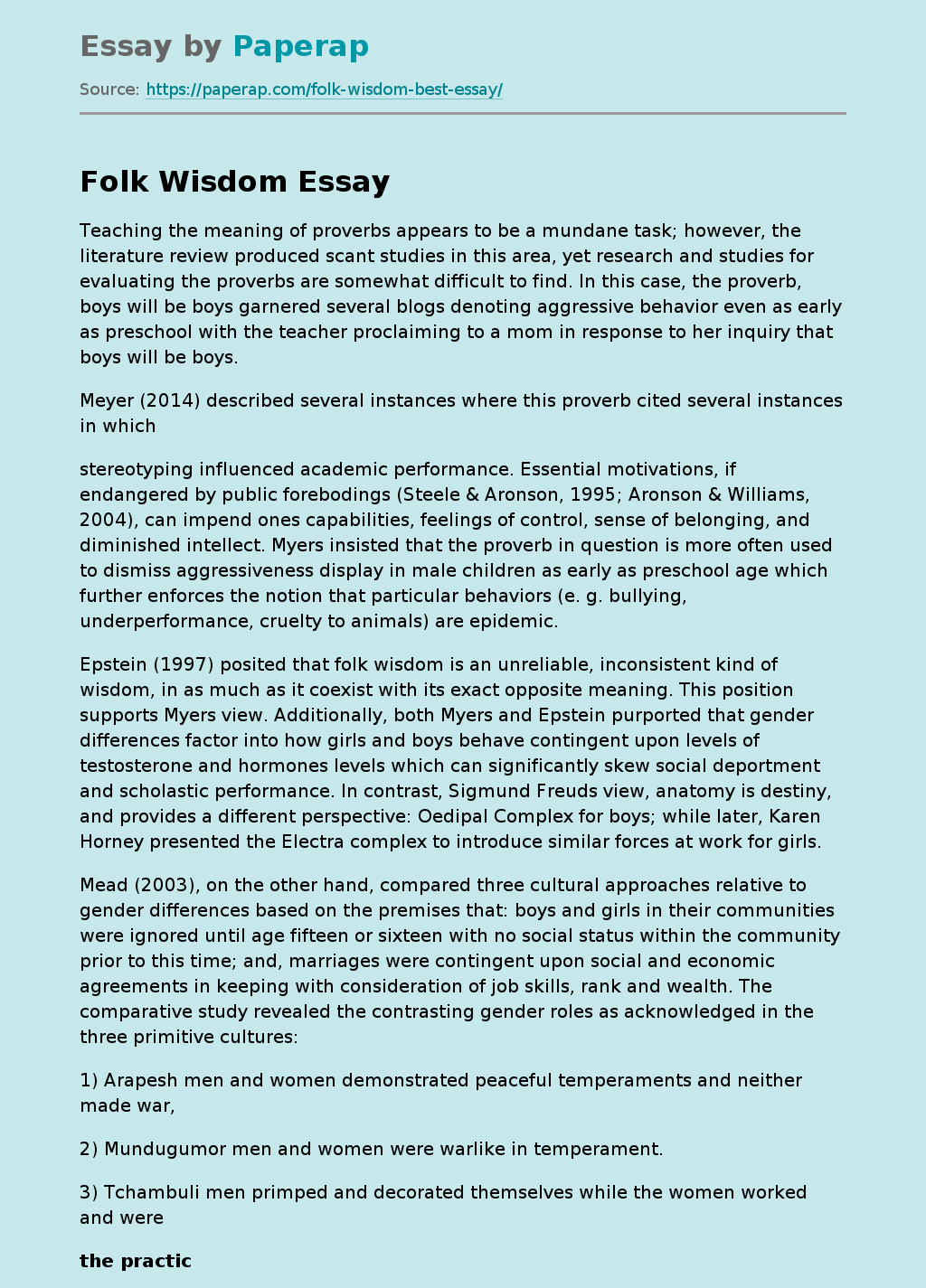Teaching Proverb Meanings: A Lack of Research
Teaching the meaning of proverbs appears to be a mundane task; however, the literature review produced scant studies in this area, yet research and studies for evaluating the proverbs are somewhat difficult to find. In this case, the proverb, boys will be boys garnered several blogs denoting aggressive behavior even as early as preschool with the teacher proclaiming to a mom in response to her inquiry that boys will be boys.
Meyer (2014) described several instances where this proverb cited several instances in which
stereotyping influenced academic performance.
Essential motivations, if endangered by public forebodings (Steele & Aronson, 1995; Aronson & Williams, 2004), can impend ones capabilities, feelings of control, sense of belonging, and diminished intellect. Myers insisted that the proverb in question is more often used to dismiss aggressiveness display in male children as early as preschool age which further enforces the notion that particular behaviors (e. g. bullying, underperformance, cruelty to animals) are epidemic.
Epstein (1997) posited that folk wisdom is an unreliable, inconsistent kind of wisdom, in as much as it coexist with its exact opposite meaning.
This position supports Myers view. Additionally, both Myers and Epstein purported that gender differences factor into how girls and boys behave contingent upon levels of testosterone and hormones levels which can significantly skew social deportment and scholastic performance. In contrast, Sigmund Freuds view, anatomy is destiny, and provides a different perspective: Oedipal Complex for boys; while later, Karen Horney presented the Electra complex to introduce similar forces at work for girls.
Mead (2003), on the other hand, compared three cultural approaches relative to gender differences based on the premises that: boys and girls in their communities were ignored until age fifteen or sixteen with no social status within the community prior to this time; and, marriages were contingent upon social and economic agreements in keeping with consideration of job skills, rank and wealth.
The comparative study revealed the contrasting gender roles as acknowledged in the three primitive cultures:
1) Arapesh men and women demonstrated peaceful temperaments and neither made war,
2) Mundugumor men and women were warlike in temperament.
3) Tchambuli men primped and decorated themselves while the women worked and were
the practical ones.
During this particular discourse, culture influences on behavioral the quote below adds substance to the outcome of this paper in relation to the influence folk wisdom has on the moral conscious of many Americans today. Constable posited that Proverbs guiding belief is that
the human intellectwisdom founded on fear of God and tutored in traditional teachings, is the prime virtue of character, and as such is the necessary (and almost sufficient) means for creating a life of success materially, physically, socially, and morally.” Equally as important,
Culture and society has an enormous impact on gender roles in America. Americans receive thousands of cultural messages each week concerning gender roles, including advertisements, movies, TV, music, magazines and family influence. This constant bombardment of information presents traditional and evolving less-traditionally defined gender roles. People subconsciously and consciously take in this cultural information about gender roles. They then evaluate the information to try and understand how the information applies to them and how they should then operate within society. While many people and organizations challenge these traditional gender roles, the influence of mainstream culture remains evident in perceptions while other cultural influences are growing.
Women are traditionally considered to be more “gentle,” “passive,” “emotional,” “dependent,” “patient” and “communicative” than their male counterparts. Adjectives such as “tough,” “independent,” “powerful,” “inexpressive” and “straightforward” are used to describe men. With these cultural labels tied to gender expectations, cultural expectations then influence how people react to each other and how they view themselves based on those labels. If the gender labels are used in a positive way, the gender bias associated with them can be lessened or even removed. In a negative sense, a self-fulfilling prophecy theory can take those gender adjectives and become the sole way people define themselves. For example, a woman who believes she is “dependent” may continue to be dependent for her entire life because she can’t see past the gender label. A woman who sees herself as strong and capable may also be more inclined to strive for advancement in the workplace. If a man is labeled as being sensitive, that may affect his life choices just as much as if he is labeled as a strong man.
Teaching Proverb Meanings: A Lack of Research. (2019, Dec 06). Retrieved from https://paperap.com/folk-wisdom-best-essay/

